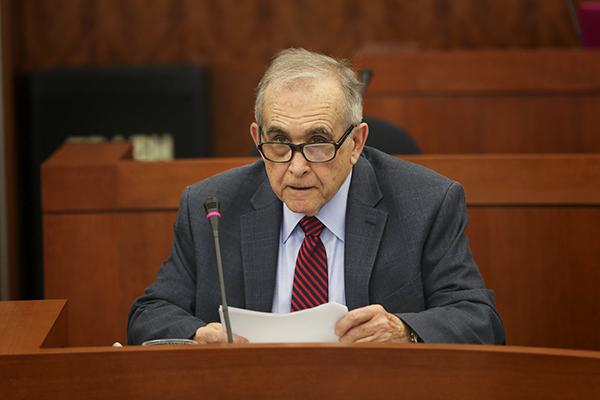Update: May 13, 2015 at 10:48 a.m.
The Faculty Senate passed three of the four proposed changes to the guidelines for faculty and their participation in governance at GW on Friday, one of the final moves that marks the close of a year-long effort to update the document.
The senate passed resolutions updating individual schools’ bylaws, the percentage of tenured faculty in each school and how deans are selected and reviewed. Officials and University trustees will now look at the resolutions before the Board of Trustees have an opportunity to vote on their approval.
Charles Garris, the chair of the Faculty Senate’s executive committee, said he will present the senate’s passed resolutions to the academic affairs committee of the Board of Trustees this Thursday.
The academic affairs committee, led by trustee Madeleine Jacobs, has overseen the faculty code revision process this year. She will work with administrators and faculty to reach an agreement and enact the resolutions.
Garris said he doubted the Board would consider the resolutions during their meeting on Friday but were more likely to review them during their retreat in June and put them in place in the fall.
He said he and the executive committee of the Faculty Senate have already been working with the academic affairs committee of the Board of Trustees to resolve differences in the two groups’ priorities.
“For faculty, rubber meets the road, and [trustees] don’t have the intimate understanding of how things work in the University,” Garris said.
Committees within the Faculty Senate reviewed proposed changes created by four working groups last semester, and Arthur Wilmarth, chair of the professional ethics and academic freedom committee, presented the amended versions of the policies for a senate vote on Friday.
The Faculty Senate already passed a resolution updating the code’s definition of academic freedom last spring as the first step of improving shared governance among faculty.
The fourth resolution on offering participation in the Faculty Senate to specialized faculty in schools was deferred until the fall. Specialized faculty are professors who do research without being tenured or seeking tenure and typically aren’t involved in management decisions at the institutions where they work, a standard the resolution could potentially change.
Under the National Labor Relations Act, faculty are prevented from unionizing if they are part of the management within an organization.
“If you look at it in a vacuum, it’s wonderful being open, inviting people to share in our governance process. Maybe these people are losing a more important right,” Garris said.
Garris said he and other members of the executive committee had hoped that specialized faculty would weigh in on the resolution in an online forum, but hadn’t seen much participation from that group. Instead, the executive committee will use the summer to solicit feedback, possibly by distributing a survey.
“There’s no point in giving them participation rights if they’re going to be losing rights under the federal law,” Garris said.
The topic of specialized faculty also came up in a resolution that would set a newly required proportion of specialized faculty in schools.
The working groups proposed that no more than 25 percent of faculty in any school could be specialized, and no more than 50 percent of faculty in a department should be specialized.
The resolution exempted the School of Nursing and School of Medicine and Health Science, because many of their faculty members are research faculty and are hired as contract or specialized faculty.
Provost Steven Lerman said the resolution should be more nuanced so different schools can accommodate their faculty needs.
“If you had to fire contract faculty, I’m not prepared to do that,” Lerman said. “We have to be very cognizant of this goal and how it can be successful, because faculty turn over slowly.”
The Graduate School of Education and Human Development and Milken Institute School of Public Health would not be in compliance with the new resolution based on current faculty numbers.
Rebecca Katz, an associate professor of health policy and emergency medicine, said professors in the public health school rely on specialized faculty to bring in money through research projects to help cover costs like salaries, a stream sometimes known as soft money.
“Our soft money makes the ability to conduct research in a fluid situation, so being able to bring on research faculty is important,” Katz said.
The Faculty Senate also voted for changes in dean search committees’ compositions, requiring two-thirds of the committees to be made up of tenured or tenure-accruing faculty. Schools could add any number of non-voting faculty to the committees.
The resolution also gives faculty on dean search committees more of an active role once deans are hired, adding in reviews of the dean every few years.
Jacqueline Thomsen contributed reporting.
This post was updated to reflect the following corrections:
The Hatchet incorrectly attributed a quote to associate professor of international affairs Alexander Downes. The Hatchet also incorrectly reported that Downes voted against the resolution to change dean search committees. He voted in favor of the change. We regret these errors.








